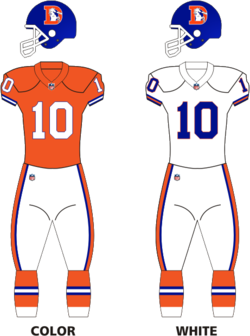| 1968 Denver Broncos season | |
|---|---|
| Owner | Gerald Phipps |
| General manager | Lou Saban |
| Head coach | Lou Saban |
| Home stadium | Mile High Stadium |
| Results | |
| Record | 5–9 |
| Division place | 4th AFL Western |
| Playoffs | Did not qualify |

The 1968 Denver Broncos season was the ninth season for the team in the American Football League (AFL). Led by second-year head coach and general manager Lou Saban, the Broncos improved their record from the previous season by posting a record of five wins and nine losses. They finished fourth in the AFL's Western division for the sixth straight season; the expansion Cincinnati Bengals finished fifth, allowing Denver to escape the cellar.
Contents
- Offseason
- NFL/AFL draft
- Personnel
- Staff / Coaches
- Roster
- Regular season
- Schedule
- Standings
- References
- External links
There were threats of the Broncos relocating to Atlanta, Chicago, and Birmingham, Alabama. [1]
The 1968 season was the first in which Denver wore blue helmets with the trademark orange "D" logo; the helmets remained the same until the 1997 season. [2]
In 1968, Bears Stadium was sold to the city of Denver, which renamed it "Mile High Stadium" and built the upper deck along the west side, raising capacity to 50,657. [3]